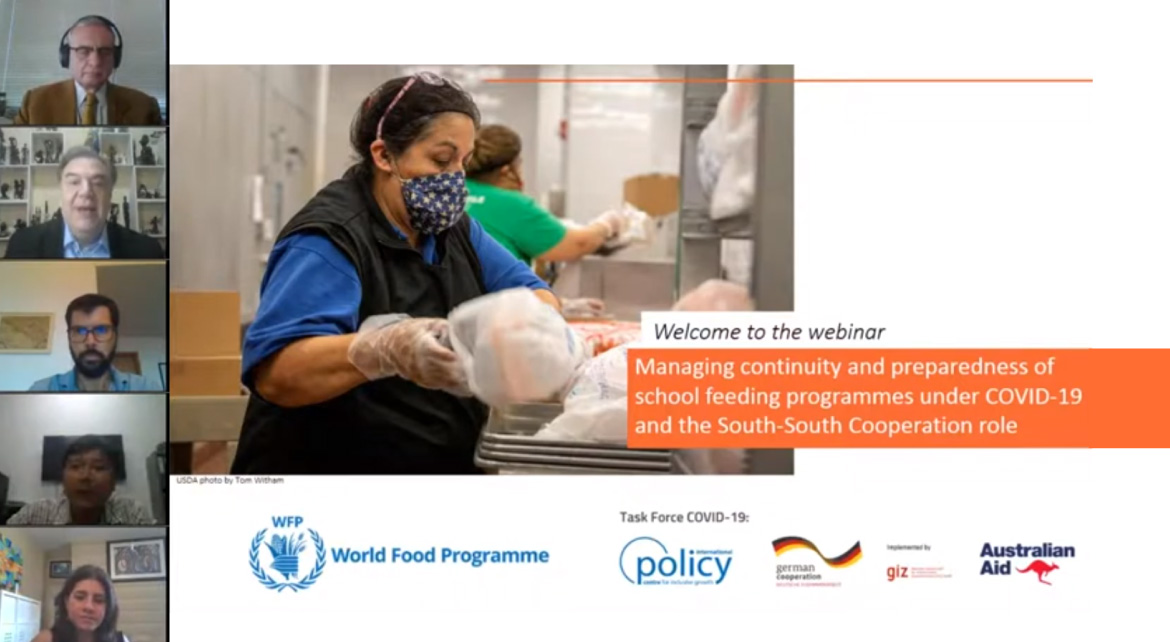
With the pandemic, at least 310 million school children are missing school meals in 162 countries. The massive impact of school closures has highlighted the importance of school feeding programmes that provide a crucial, widespread safety net that supports vulnerable children and their families. Many low- and middle-income countries are adapting their programmes to continue supporting children during school closures and will soon turn their attention towards school reopening. South-South Cooperation, as a means for knowledge exchange and technical assistance, can contribute to programme adaption and resilience in the process of reopening schools. To discuss those themes, a webinar held on July 21st brought together experts who analysed the current global scenario and the way forward for school feeding programmes.
The event was organized by the World Food Programme (WFP) and the United Nations Office for South-South Cooperation (UNOSSC) and was promoted by the International Policy Centre for Inclusive Growth (IPC-IG). In his opening remarks, Daniel Balaban, Director of the WFP Centre of Excellence against Hunger Brazil and moderator for the session, presented an overview of how the WFP is helping governments to strengthen their capacities to run national school feeding programmes and the pivotal role played by South-South cooperation. He also spoke about how WFP’s work had to adapt in order to respond to the new challenges imposed by the pandemic. “In the scenario we are living in, we must continue, at the same time, to keep delivering for the most vulnerable and to start thinking about how to continue preparing our programmes for the next crisis, be it financial or a second wave of the pandemic”, he said.
Cooperation and new solutions
The first to present was by Jorge Chediek, Director of UNOSSC. He highlighted the importance of children having access to adequate and nutritional meals during the Covid-19 crisis. He argued that supply chains are being affected by the pandemic and this can have long-term impacts on food security around the world. “Food producers are facing large losses on perishable and nutritious foods as the supply chains are disrupted and also the consumption patterns shift”, he said. He also mentioned some examples of countries that are adapting their programmes to respond to the current crisis and the importance of sharing those successful experiences through South-South and triangular cooperation.
Following that, Carmen Burbano, Director of WFP School-Based Services, described the importance of school meal programmes in poor and vulnerable regions. She also mentioned the importance of locally sourced ingredients for the preparation of those meals. In addition to promoting a healthier diet, this also supports local agriculture. Carmen Burbano also mentioned solutions being implemented by countries to adapt to the new situation. Examples of these new ways of making sure that children continue to receive adequate meals include food stamp assistance to households with children, delivery of food parcels, supermarket vouchers and cash transfer.
Country experiences
The following section of the webinar was focused on country experiences, with presentations by Mozambique, Colombia and Cambodia. Pedro Mortara, Programme Policy Officer at WFP Mozambique, explained that the country office established partnerships with local authorities to support families affected by school closures. Classes across the country were suspended in March and there are no plans for reopening schools. He highlighted the importance of take-home rations, a solution that had already been used in the aftermath of cyclone Idai in 2019. Now, this new response is supporting 41,000 children in 104 schools in the Tete province.
The experience of Colombia was featured next, during a presentation by Juan Carlos Martinez, Minister of Education of Colombia. Schools were also closed in March and since then the country has been adapting the national school feeding programmes to continue to assist children, which included food supplements delivered to families, food baskets and food vouchers. Distribution operations are tailored to each region and each delivery contains recommendations about healthy eating and hygiene.
To close the session, Chhun Ramy, from the Ministry of Education, Youth and Sports of Cambodia, shared his country’s experience in guaranteeing the continuity of the country’s three school feeding programmes. As classes were suspended, take-home meals started to be distributed. As students start to gradually go back to school, take-home baskets will remain available to those students who stay at home.
Click here to watch the full webinar and here to access the slides presentation.





